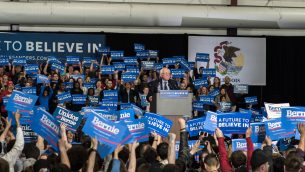Audience Political Communication

Choice Matters: Responses to Political Information Vary in Randomized vs. Selective Exposure Contexts
Why do we focus more on the bad than the good? Why do we seek out the more traumatic vs. feel good news stories? It is well documented through “negativity bias” research that negative information is weighted greater than positive information, whether it be judging others facial expressions or recalling news events.
However, research is lacking when it comes understanding when positive news may be more in favor than the negative. Juliana Fernandes, University of Florida College of Journalism and Communications Advertising assistant professor, and colleagues wanted to learn more about the factors that could affect one’s inclination to veer toward negative or positive information, including age, political uses and approaches, and the type of exposure to news.
Why look at types of exposure? Randomized exposure (e.g., news being broadcast in a waiting room) and selective exposure (e.g., seeking a news article online) are important factors to evaluate, as it is believed that a user is more likely to share content they have selected, and find it more credible, versus content that they just happened to see.
In one study, participants were randomly exposed to either a positive or negative story. The researchers found that positive stories were more likely to be shared than negative news stories, and that younger participants were more likely than older participants to share the story. Interestingly, even though younger participants were more likely to share positive stories, they perceived both the author and the story to be more credible in negative news stories. Older audiences on the other hand, perceived both author and story to be less credible in negative stories. While political affiliation did not have a significant effect on perceived credibility of stories, the research showed that Democrats were more willing to share stories than Republicans.
In a second pair of studies, participants were given the option to choose a positive, negative or neutral story. The researchers found that participants were more likely to choose positive or neutral stories rather than negative, regardless of age or perceived credibility of the author or story. The research did indicate that Republicans were more likely than Democrats to share a positive story.
The research suggests that those who are actively engaged with and want to seek out political information are more willing to share news stories and find the author and story more credible, independent of story tone and whether or not they chose the story or were randomly exposed to it.
This study provides insight into how user exposure and selection of news can play a part in the beliefs of the story and effect post-consuming actions. The stage of life of the consumer, their political affiliations and news-seeking behaviors can all play a role in their habits and choices.
The original article, “Choice Matters: Responses to Political Information Vary in Randomized vs. Selective Exposure Contexts,” was published Mass Communication and Society on April 27, 2021.
Authors: Juliana Fernandes, Nicky Lewis, Cheng Hong
This summary was written by Alexandra Avelino, UFCJC M.A.M.C. 2020, Student Affairs Program Coordinator at the UF College of Veterinary Medicine.
Posted: June 25, 2021
Tagged as: Juliana Fernandes, Negativity Bias, Political, Trust


